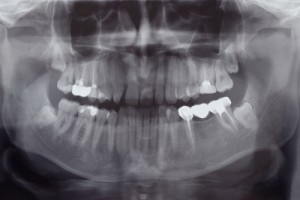Dentist in Norridge
What makes teeth sensitive?
 If the idea of biting into an ice cream sandwich makes you cringe, you may be one of the millions of people who suffer from sensitive teeth. This is often caused by movement of fluid in the dentin – the soft inner tissue beneath the enamel of your tooth. This motion irritates the tooth nerve, creating a tingling sensation and sometimes pain.
If the idea of biting into an ice cream sandwich makes you cringe, you may be one of the millions of people who suffer from sensitive teeth. This is often caused by movement of fluid in the dentin – the soft inner tissue beneath the enamel of your tooth. This motion irritates the tooth nerve, creating a tingling sensation and sometimes pain.
Another common cause of tooth sensitivity occurs when the tiny tubes of fluid in the dentin become exposed. This can happen due to tooth wear, receding gums, or damage to the tooth. When this occurs, pain is triggered by eating or drinking foods that are hot or cold, sweet or acidic, and even through contact or exposure to air.
Whitening and orthodontic treatment may cause temporary teeth sensitivity. In most cases, this type will disappear within a week or two. In severe cases of sensitivity, the tooth nerve itself may be exposed, causing severe pain and irritation and requiring immediate treatment.
What can you do about sensitivity?
If you are suffering from sensitivity in your teeth, tell your hygienist or dentist at your next dental visit. They may need to screen for more serious underlying causes that could need treatment. They will also be able to recommend your best method of managing your discomfort.
Is sensitivity preventable?
Some forms of sensitivity are preventable. Avoid using hard-bristled toothbrushes and do not brush aggressively. This can cause higher levels of wear that lead to sensitivity. If you participate in sports, wear a mouthguard to protect your teeth from trauma. Chipped and cracked teeth often become sensitive.
Once serious underlying issues have been ruled out, you can help to manage mildly sensitive teeth with special toothpastes that are designed to decrease your sensitivity. If these do not provide sufficient relief, ask whether a prescription product may be needed.
If you experience tooth sensitivity, contact our office to schedule an appointment. We can help.
7615 W. Montrose Ave.
Norridge, IL 60706-1045
Phone: (708) 453-0777




 The year is closing and holidays are on the horizon. Are you planning year-end travel or a last-minute getaway? Before heading out on your next adventure, make sure you are prepared with these 3 quick tips for maintaining optimal dental health during travel.
The year is closing and holidays are on the horizon. Are you planning year-end travel or a last-minute getaway? Before heading out on your next adventure, make sure you are prepared with these 3 quick tips for maintaining optimal dental health during travel. Most serious oral health issues can be prevented by maintaining an effective routine of dental hygiene and in-office care. However, you could be at higher risk for some oral illnesses due to hereditary factors. Awareness and proper treatment can help minimize these risks. Here are a few of the most common oral health concerns that are affected by genetics.
Most serious oral health issues can be prevented by maintaining an effective routine of dental hygiene and in-office care. However, you could be at higher risk for some oral illnesses due to hereditary factors. Awareness and proper treatment can help minimize these risks. Here are a few of the most common oral health concerns that are affected by genetics. Loose teeth, bad breath, and painful, bloody gums – these are among the signs and symptoms of periodontal, or gum, disease. Unfortunately, periodontal disease can also begin without any obvious symptoms. If left undiagnosed or untreated, you could be at risk for irreparable damage to your teeth and gums. The good news is that periodontal disease is preventable. In fact, one of the most effective tools for preventing the disease only takes a minute of your time each day.
Loose teeth, bad breath, and painful, bloody gums – these are among the signs and symptoms of periodontal, or gum, disease. Unfortunately, periodontal disease can also begin without any obvious symptoms. If left undiagnosed or untreated, you could be at risk for irreparable damage to your teeth and gums. The good news is that periodontal disease is preventable. In fact, one of the most effective tools for preventing the disease only takes a minute of your time each day. At times, our patients schedule their appointments, not wanting x-rays taken or thorough oral screenings. They trust their regular dental cleanings will be adequate. However, it is important for you to know that complete oral exams, including x-rays, can help save your life.
At times, our patients schedule their appointments, not wanting x-rays taken or thorough oral screenings. They trust their regular dental cleanings will be adequate. However, it is important for you to know that complete oral exams, including x-rays, can help save your life.